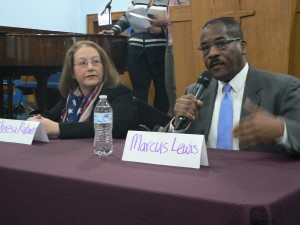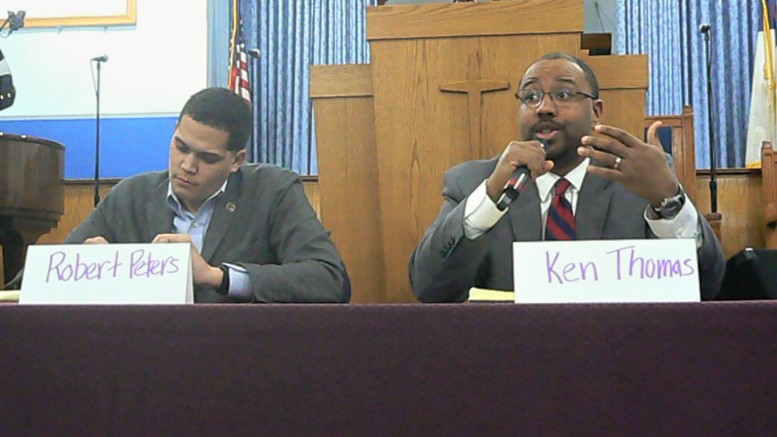Southeast side groups hold forum for 2nd Congressional and 13th District State Senate Races
By La Risa Lynch
A collection of southeast side community groups hosted a candidates forum for both the 2nd Congressional and 13th Senate District races on March 6th. The two-hour forum, held at Pilgrim Missionary Baptist Church, 3235 E. 91st St., focused on specific issues facing former steel-making communities like South Chicago, Jeffery Manor, East Side and South Shore.
These communities saw their fortunes turn when the steel mills closed in the 1980s and early 1990s. And communities like South Chicago has struggled to attract investment especially for the nearly 500-acre former South Works site. The massive beachfront property has sat vacant for years amidst two failed attempts to redevelop the property.
The development of the South Works site is essential, said Amalia NietoGomez, Alliance of the SouthEast’s (ASE) executive director. Her group co-sponsored the forum with Centro de Trabajadores Unidos: United Workers’ Center, Claretian Associates, Coalition for a South Works CBA, Metropolitan Family Services, Pilgrim Missionary Baptist Church, and Southeast Environmental Task Force.
The property, NietoGomez said, is one of the largest developments in the Midwest that could produce thousands of good paying jobs for an area suffering from high unemployment. In South Chicago, where the forum was held, the unemployment rate is 20.3 percent, five times higher than the state’s unemployment rate of 3.7 percent.
“There is a lot of different issues that are facing the southeast side that are important that we need our candidates to take action on,” NietoGomez said.
The forum was split into two rounds —the first focused on the 13th District State Senate race where incumbent Robert Peters faces challenger attorney Ken Thomas. Peters was appointed to the post when Kwame Raoul was elected attorney general in 2019. A scheduling conflict prevented Cong. Robin Kelly from facing off with her two challengers in the March primary — Democrat Marcus Lewis and Republican Theresa J. Raborn.
Other issues facing the southeast side include underfunded schools, immigration enforcement and environmental issues. NietoGomez noted the area has become “a dumping ground for the city.” Some of the worst polluting companies like Finkle Steel and General Iron have or will relocate to the area – many of them displaced by the Lincoln Yards development.
That development along with The 78 got billions of dollars in subsidies while the redevelopment of South Works site tanked because of lack of remediation funding, NietoGomez said. She noted the state gave $6 billion to purchase a transit hub for the proposed One Center development near McCormick Place. She said the South Works site needs the same financial consideration.
The candidates were quizzed on a myriad of issues including supporting worker cooperatives, bail reform, funding for after school programming, proposed changes to the federal Community Reinvestment Act, which encourages bank lending in low-income communities and the consolidation the area’s four hospitals.
On using state funding and tax increment financing (TIF) to shore up struggling communities, both Peters and Thomas noted that the southeast side has been severely disinvested for years.
Peters admitted he has concerns about TIF reforms. But he said directing money into the South Work site could be used to do affordable housing, clean or renewal energy like solar panels or clean up area brownfields.
South Works, he said, is a golden opportunity that must be done right. The site, he noted, has moved from one developer to another. First McCaffery Interests pulled the plug to build a mixed-use neighborhood in 2016. Two years later Emerald Living withdrew plans to construct 20,000 units of housing on the site.
“We’ve seen promises at South Works over and over again,” Peters said.
The South Works site has sentimental value to Thomas. His father worked there before going to the Ryerson steel plant on 111th Street. When that plant closed, his father was laid off. Thomas called it disappointing that smaller developments have received massive economic investments unlike the South Works site. The challenge, he said, is ensuring investments happens here too.
But jobs Thomas noted are now located downtown and the southeast side lacks solid transit to get residents to those jobs. He said he favors a proposal to reduce Metra rates.

Both Marcus Lewis (r) and Theresa Raborn (l) pledge to bring resources back to Chicago to address eneviornmental issues affecting the Southeast Side.
Congressional candidates were questioned on addressing the area’s environmental issues. Both Lewis and Raborn pledged to bring resources back to Chicago to address the issue. Having a healthy community is important to Raborn. She and her daughter have asthma. She noted certain areas in the district don’t have clean air or drinking water.
“No parent should have to sit and watch their child not be able to breathe,” Raborn said. “We haven’t had the investment in our district that we need. We need some who is going to fight for that on the House floor in Washington.”
Lewis called the contamination in the area “grotesque,” which hurts future development. “In order for it to be revitalized and be a place that is hospitable to new investment, it can’t be looked upon as ‘Oh. That’s a garbage dump.’”
On immigration all the candidates had vary responses. The forum’s organizers noted that the day of the event, ICE conducted a raid in the area. They reminded some participants the term illegal immigrant is a derogatory term. The preferred term is undocumented immigrants.
Raborn said she favors deporting individuals who’ve committed crimes when there “is an ICE detainer to deport someone like that.” She does not, she said, favor rounding up people off the street if they have not committed a crime. But, Raborn noted she has a plan to “to give illegal immigrants a pathway to citizenship. It is not amnesty. It is a way to bring them into the fold.”
Lewis supports the Dream Act, which he says, is a way for individuals to remain in the U.S. if brought here as children. “They shouldn’t be exported because they really have no other home,” Lewis said. “For those that cross the border, I’m for upholding to the laws…. I’m against violations of immigration laws.”
Peters was the chief Senate sponsor of a legislation that made Illinois the first in the nation to ban private immigration detention centers. It is important, he said, to pressure ICE, the city, county and the state that coming into communities to detain people is unacceptable.
“I am willing to organize and fight to do whatever we can, to tell Donald Trump and ICE that [they are] not coming to Illinois because this is a sanctuary city,” he said.
In his law practice, Thomas said he has advocated for vulnerable populations including domestic violence victims, asylum seekers and successfully sued the U.S. Justice Department.
“The reason why is that they have been attacking the Latinx community. They have been attacking a lot of groups,” Thomas said. “I have stood up for this community and my clients against the racist Justice Department, [former U.S. Attorney General] Jeff Sessions and Trump in court and have won. And I will continue to do that as state senator.”

Be the first to comment on "Development, Environment, Immigration key issues for Southeast Side residents in March Primary"